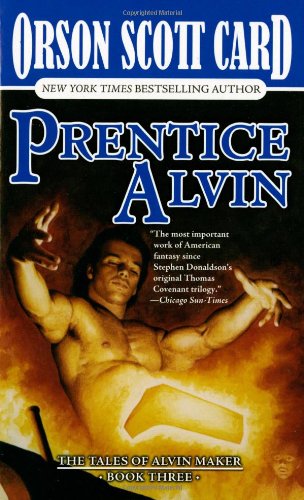
![]() Prentice Alvin by Orson Scott Card
Prentice Alvin by Orson Scott Card
Prentice Alvin is the third book in Orson Scott Card’s TALES OF ALVIN MAKER. After the excitement in the last book, Red Prophet, when Alvin and his family experienced the Battle of Tippecanoe, Alvin is finally off to Hatrack River, where he was born, to begin his apprenticeship to Makepeace Smith, the blacksmith. He’s also hoping that Peggy, the Torch who watches over him, can help him figure out what it means to be a Maker because he’s had a vision of the Crystal City he must build.
Peggy, who can see Alvin coming and knows he’s destined for greatness, realizes she’s in love with him and worries because she has no skills or education that will help him learn to be a Maker, or that will even cause him to admire her for more than her good looks. (Thank you, Mr. Card, for always giving your leading women a desire to be admired for more than their beauty!) So Peggy runs away to get educated and to acquire some social graces. (But not enough social graces to inspire her to write to her worried parents or to reveal herself to them when she comes back to Hatrack River disguised as a teacher.)
Just before Peggy leaves Hatrack River, she helps a black slave girl who has used some evil magic to escape from the master who was raping her. The magic kills the girl, so Peggy’s parents decide to raise the girl’s “mixed up boy” as their own. Now they must deal with all the problems that occur in a society where Blacks are considered inferior to Whites. Meanwhile, the slave owner, who has been convinced that God wants him to dilute the entire black race with his own white genes, is hunting for his escaped property.
There are some emotional moments, a few scary events, some nice lessons, and even some dark humor in Prentice Alvin, but after two books about how Whites are mistreating others in early America (the previous book, Red Prophet, was about how the “Whites” treated the “Reds”), it’s hard to avoid the suspicion that the TALES OF ALVIN MAKER is becoming a platform for lessons on social justice. (One begins to wonder which minority group will be championed in the next book. “Gays”?…. uh, probably not.)
The beginning of Prentice Alvin moves slowly, especially the parts where Peggy gets nervous about Alvin’s arrival. There’s a lot of angsty dialogue here that becomes tiresome (I felt the same way about some of the dialogue in Card’s ENDER WIGGIN novels). Alvin’s life in Hatrack River isn’t nearly as exciting as his adventures in Red Prophet. His apprenticeship lasts seven years. During that time we see him turn into a strong man, acquire a trade, discover more about his own sinfulness and pride and, when Peggy returns from school and begins to teach him, learn enough about quantum mechanics that he begins to understand his power as a maker. This part of the story is fairly interesting, though it kind of goes off the deep end when, at the climax of the story, Alvin creates a living golden plow for his Journeyman project. Huh?
Overall, this third book in the series is well-written (as always) but doesn’t do much to advance Alvin’s story and felt more like a lesson to me. Nevertheless, it won the Locus Award for Best Fantasy Novel in 1990 and was nominated for a Nebula and Hugo award, probably for its social justice themes. Personally, I feel like the saga is slowing down, just like I felt with the third book in the ENDER WIGGIN series. Readers who just enjoy spending time with Alvin and Peggy will probably be more patient than I was. I’m hoping the next book, Alvin Journeyman, will be more exciting.
I’m reading Blackstone Audio’s production which is narrated by Orson Scott Card, Stefan Rudnicki, and Gabrielle de Cuir. They are doing a great job, but I had to speed them up.









Agree! And a perfect ending, too.
I may be embarrassing myself by repeating something I already posted here, but Thomas Pynchon has a new novel scheduled…
[…] Tales (Fantasy Literature): John Martin Leahy was born in Washington State in 1886 and, during his five-year career as…
so you're saying I should read it? :)
As a native New Yorker, I love the idea of the city being filled with canals and no skyscrapers! And…